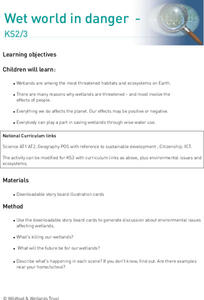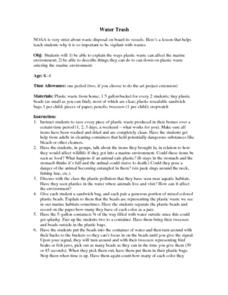Curated OER
Fred the Fish -- A River Ran Wild
Students apply cause and effect relationships to water pollution in a stream. In this pollution lesson students recognize the importance of clean water in their daily lives. Students accompany "Fred the Fish" as he travels down stream....
Curated OER
Oh Deer!"
Young scholars explore the essential components of a habitat, which is food, water, and shelter. They end the instructional activity by paying the Oh Deer! game.
Curated OER
Wet World in Danger
Students investigate the reasons why wetlands are threatened especially by people. They study the wise use of water to preserve wetlands.
Curated OER
Design a Reef!
Here is an ambitious, but highly valuable undertaking: set up a miniature coral reef in your classroom. Young marine scientists research coral reef ecosystems and ensure all vital factors are included in their functioning model. The...
Curated OER
Faking It
Middle school earth scientists describe the behavior of the Coriolis force. They compare and contrast conditions under which the Coriolis force has a significant impact with conditions under which it has very little. They model the...
Curated OER
Migration Migraine
Students partipate in a demonstration in which they role play animals migrating between breeding and wintering habitats and encountering hazards at each end of the journey.
Curated OER
Water Trash
Students explain the ways plastic waste can affect the marine environment. They are able to describe things they can do to can down on plastic waste entering the marine environment.
Curated OER
Head to Foot
Students describe the body form and major anatomical structures of squids and describe some unusual or unique features of newly-discovered deep water squid species. They infer what types of food squids use from their anatomical features.
Curated OER
Habitat Lap Sit
Fourth graders physically form a circle that shows the interconnectedness of the components of a habitat. They form circles and role play the parts of habitats.
Curated OER
Boom and Bust
Students investigate commercial fishery. In this fishery lesson, students describe stages in commercial fishery, interpret data and predict when a fisher stock is showing signs of overexploitation.
Curated OER
What Are Ecosystems?
Third graders recognize and examine ecosystems. They observe and describe habitats within ecosystems and observe and identify organisms with similar needs that compete for resources.
Curated OER
I See a Coyote
Students role-play coyotes looking for natural resources. In this natural resources lesson, students examine the relationship between animal life and the environment. Students play a game that demonstrates how natural...
Curated OER
My Habitat Address
Sixth graders draw a habitat and write about what they would need to survive in the habitat. They define the input of items such as materials, energy, and information, and what goes out of the habitat. They play a "Habitat Address" game,...
Curated OER
Animal Movements
Students discuss the behavior of different animals and how they move. They explore the ways that this helps them live and find food in their environment. They participate in a game that requires them to mimic the ways in which animals move.
Curated OER
Mapping the Ocean Floor
Students study the bottom structure of underwater habitats and how they can be mapped.
Curated OER
Sustainability
Here is an in-depth, and incredibly thorough lesson plan on sustainable agricultural practices; specifically, regarding the growth of coffee. After completing and discussing a worksheet called "Thinking About Tomorrow," groups of...
NOAA
Biological Oceanographic Investigations – Through Robot Eyes
How can a robot measure the length of something when we don't know how far the camera is from the object? The lesson explains the concept of perspective and many others. Scholars apply this knowledge to judge the length of fish and the...
Curated OER
Species at Risk: Recovery Teams to the Rescue!
Sixth graders discuss how certain species and plants are deemed endangered. They work together in conservation recovery teams to research an endangered species. Then they explore efforts to make sure that the existence of these species...

















